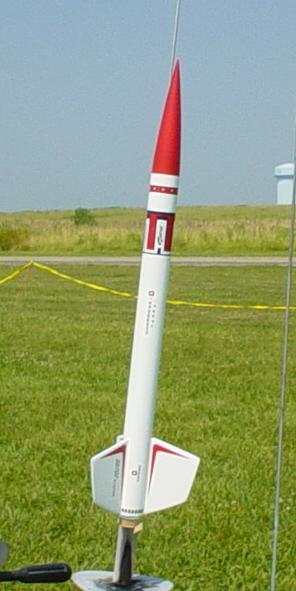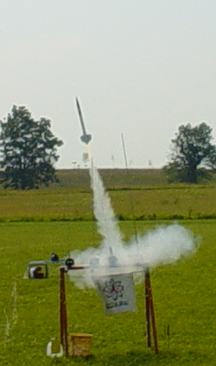Thrustline Aerospace Cherokee D
Thrustline Aerospace - Cherokee D {Kit}
Contributed by Bill Eichelberger
| Construction Rating: | starstarstarstarstar |
| Flight Rating: | starstarstarstarstar_border |
| Overall Rating: | starstarstarstarstar_border |
| Diameter: | 1.33 inches |
| Manufacturer: | Thrustline Aerospace |
| Style: | Clone |
 Brief:
Brief:
ThrustAero Rocketry is another of the growing list of vendors serving the (hopefully) burgeoning OOP cloning aftermarket. They sell versions of several Estes classics, including the Cherokee D, one of the early K-kits whose name once included the Astron qualifier. While it's 3FNC design qualifies it as a fairly basic project, it's paint and decal scheme were well thought out and turning out a great looking vintage rocket requires minimal effort. I had cloned the stretched, plastic-coned brethren to this classic in 2002, and flew it to it's unfortunate near-demise when an Estes D-12 went on a trip up through the body tube. I had been planning on eventually cloning the original version with a BMS cone, so this was a welcome project.
Construction:
The kit includes:
- BT-55V
- BNC-55AC
- 24mm engine mount kit
- Kevlar shock cord
- sewing elastic shock cord
- screw eye
- 18" Mylar parachute
- 1/8" balsa fin stock
- launch lug
- decal sheet
- instructions
For all of you who grew up building the classic Estes rockets of the '60's and '70's, building this kit will be a treat. Using copies of the actual Estes Cherokee D instructions, ThrustAero has faithfully recreated the vintage building experience while at the same time giving nod to two of the more useful improvements that have come about in the past 40 years, using Kevlar thread in the recovery system and updating the parachute to reflective Mylar for it's durability and visibility. Since both of these are internal improvements, when it's standing on the pad you'd never be able to tell a ThrustAero kit from a vintage Cherokee D, which in my eyes is the true mark of a classic clone. Armed with the original instructions and the single page of updates provided by ThrustAero, construction is straightforward and trouble free. Those of you brought up cutting your own balsa might be struck by a sense of nostalgia, while those of you who are used to die-cut or laser-cut balsa will learn what it was about to build a rocket in the good old days. Despite the extra work, the Cherokee D is a remarkably quick build.

Finishing:
The body tube spirals weren't excessive due to the craft-paper coated body tube, but the balsa needed the normal two coats of slightly thinned Elmer's Fill 'n' Finish to smooth out the grain. This was followed by two coats of Krylon Sandable Primer, two coats of Krylon Gloss White and two of Gloss Red for the nose cone. The decals are high quality aftermarket waterslide decals, and needed to be sprayed with several light coats of clearcoat before using them. Anyone who ever worked with waterslide decals in the "good-old-days" will undoubtedly remember the special pain that they can cause for a modeler. While they aren't easy to apply, they still wind up looking better than sticker decals, even with the occasional "glitch". I had many occasions to "glitch", but the rocket still turned out looking great. The decals snugged down without the aid of decal set, but once they were on, they were ON. The moral: get it where you want it on the first try, because that's where they'll stay more often than not.
Construction Rating: 5 out of 5
 Flight:
Flight:
After what seemed like an interminable wait for A) decent weather on B) a launch day when I had no soccer or family obligations to worry about, with C) a field that would be able to handle the drift-potential that this rocket on a D engine could conceivably create, I finally got my day. The actual launch day turned out to be almost perfect, with crystal clear skies, though slightly more wind than I would normally have wished for. I bought a pack of D12-5's specially for this rocket and it didn't disappoint. All three flights (one on a C11-5) weathercocked into the wind, but the prodigious altitude allowed them plenty of time and space to drift back toward the launch site on recovery. The fourth flight, several weeks after the first three, weathercocked severely, but the stiff winds brought it back to within a few hundred yards of the launch pad. I had tried to get a lift-off picture while making the first three flights, but this thing gets off the pad quick, and in the end all I managed to capture was the smoking evidence that I had indeed flown the rocket. For the fourth flight I was much luckier and/or quicker, and wound up with a great launch picture. Unfortunately the stiff winds dictated that this be the only flight of the day for the rocket on it's second day of launching.
Recovery:
This was the spot where I encountered an unexpected bit of trouble. After recovery on the second flight I noticed a moderately severe dent at the top of the body tube where the nose cone had rebounded back into the body at ejection. The dent was "repairable" with only the flick of a practiced thumb, and wasn't repeated on the third flight, but it leads me to believe that the potential is there for it to be a regular problem. I would have gone with twice the enclosed amount of shock cord for my own cloning creations, and it might not be a bad idea to do so with this kit, especially considering the ejection pop of the Estes D. With this in mind, I added an additional 18" section to the shock cord for the fourth flight and didn't have any problems at all.
Flight Rating: 4 out of 5
Summary:
This project was a winner from start to finish. I love the added kick that the D engines give to small rockets and plan on flying this one regularly alongside my Astron Goblin clone. I'm surprised that there aren't more garage-based companies serving the "cloning community" in this fashion. Two that were, Lawn Dart Rocketry and Blast From The Past Rocketry, have either permanently stopped operations (Lawn Dart) or suspended them for an indefinite period (BFTPR). Too bad. It's a segment of the rocketry industry that I'd love to see prosper, and with the incredible assortment of discontinued kits from equally discontinued manufacturers, it would seem to be a fairly broad playing field. ThrustAero has done a credible job of recreating the Cherokee D, and also offer clones of the original Estes Nike X, X-Ray, Astron Drifter and two Honest John's. To date the Cherokee D is the only one I've built, but I see no reason to stop there, especially if their promise of "upcoming clones" is fulfilled. (A Red Max clone comes to mind here, but the mind just swims with possibilities. Wolverine? Maybe a token Centuri offering?)
Pro's:
- The Cherokee D was one of the classiest 3FNC rockets in the early Estes stable.
- Sense of "back in time" during build process.
- Faithful recreation of a classic kit.
- Astron mystique. (I'm big on "mystique".)
Con's:
- Shock cord a little short. (I'd double it to be safe.)
Overall Rating: 4 out of 5
Other Reviews
- Thrustline Aerospace Cherokee D By Greg Deeter
Brief: This is a single stage three finned rocket with a balsa nose cone. It is a simple clone kit of a very popular high performance rocket offered by Estes from 1970 to 1972 as the "Astron Cherokee-D" and from 1973 to 1983 as the "Cherokee-D". I believe this was the very first kit offered by what is now known as Thrustline. I purchased it on eBay in late 2001 to early 2002. It arrived ...
 |
 |
Flights
 |
 |